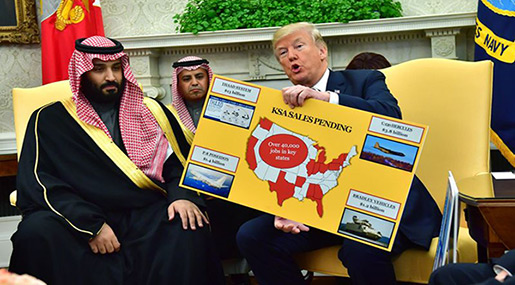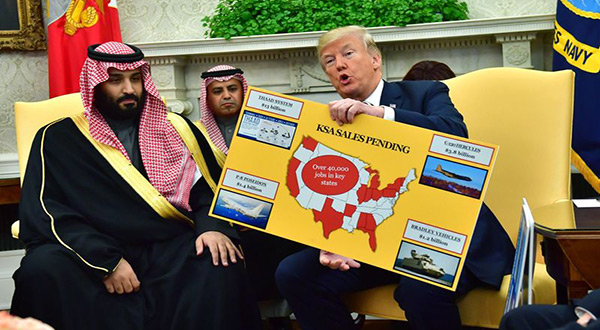
America Is Fawning over Saudi Arabia’s Repressive Dictator

Zack Beauchamp
This week, the crown prince of an absolute monarchy ... came to visit the United States. But Saudi Crown Prince Mohammed bin Salman was received less like a human rights abuser and more like a visionary civil rights hero, or a celebrity cross between Abraham Lincoln and Elon Musk.

60 Minutes hailed him as a "revolutionary" who is "emancipating women" in Saudi Arabia. CNBC ran a piece with the headline "Mohammed bin Salman is bringing Silicon Valley-style disruption to Saudi Arabia." On Wednesday, the prince had dinner with Morgan Freeman, director James Cameron, and The Rock, who wrote an Instagram post lavishing praise on the autocrat.
"A pleasure to have a private dinner with the Crown Prince of Saudi Arabia, Mohammed bin Salman," The Rock wrote. "Fascinating experience to hear his deep rooted, yet modern views on the world and certainly the positive growth he desires for his country."
It's true that MBS, as he's commonly called, is, by Saudi standards, relatively progressive on certain issues. He's allowed women to attend soccer matches, for example. But calling this "emancipation" is more than a little absurd: Saudi women are still not allowed to get married or travel internationally, among other things, without the permission of a male guardian. And Saudi Arabia is still the seventh most gender-unequal country in the world, according to one World Bank metric.
Focusing on these modest reforms ignores the fact that MBS is the architect of Saudi Arabia's war in Yemen, where Saudi forces have bombed hospitals and deliberately restricted the flow of vital goods (like food and medicine)...
Well over 10,000 people have died since Saudi Arabia's intervention in Yemen in 2015; we can only roughly estimate deaths because the situation is too dangerous for anyone to conduct an authoritative casualty count. The Saudi blockade has choked off access to food so thoroughly that 17 million Yemenis - two-thirds of the population - don't know where their next meal will come from. The damage to Yemen's health and water services is so extensive that sewage has contaminated the water supply, causing the worst cholera outbreak - more than 1 million documented cases - in modern history.
The war in Yemen was MBS's idea: It's widely seen as his signature foreign policy initiative. Yet despite his responsibility for what Amnesty International has labeled "possible war crimes," American media and society is treating him like a hero.
"[It's] appalling," Marc Lynch, a Middle East expert at George Washington University, says of the crown prince's reception in the US - appalling in a way that speaks to fundamental problems with the US-Saudi relationship.
Why MBS got a hero's welcome in America
The United States is no stranger to celebrating friendly Middle East autocrats. Egyptian President Abdel Fattah el-Sisi, whose military once killed more than 800 peaceful protesters in a single day, was praised as "Islam's Improbable Reformer" in the Wall Street Journal due to his opposition to "Islamism". When Sisi won "reelection" this Monday, by a subtle 97-3 margin, President Trump called to congratulate him.
But the sycophancy we've seen on display during the MBS visit to America has reached a new level. The sheer volume of pro-MBS rhetoric in the press, and his meetings with politicians and pop culture figures alike, dwarfs what we typically see with pro-American dictators. He got a friendly reception from all sorts of powerful American figures, from Trump on down.
Experts say this isn't an accident.
"His domestic reforms and rhetoric have been carefully crafted to resonate here," Lynch explains.
Another part of the story is that the Saudis, along with other Gulf monarchies like the United Arab Emirates and Qatar, have spent huge amounts of money in Washington. They have armies of PR staff and lobbyists and provide ample support to prominent think tanks. As a result, many influential Americans see the Saudis through the lens of their pro-US foreign policy rather than their awful human rights record.
"Money talks," Ben Rhodes, one of President Obama's top foreign policy aides, told me when I asked him about the MBS coverage.
One can debate whether maintaining a close relationship with Saudi Arabia is in the best interests of the United States. That's a complex and difficult question, one that reasonable and well-meaning people can disagree about.
But what can't be disputed, what cannot be argued in good faith, is that Mohammed bin Salman deserves to be treated like a rock star in American society.
It may be the case that the US needs MBS as a matter of geopolitics, but America's media and cultural elite have no role in forming policy. They're entirely free to call out MBS for his country's execution of gay people and his human rights abuse in Yemen without consequences for American strategic interests.
Not every media outlet fell down on the job. The Atlantic's Jeffrey Goldberg, for example, did a tough interview - asking him if he believed men and women are equal (yes) and then following up by asking whether he'll repeal the guardianship system that prevents women from traveling without male permission (no).
But Goldberg was the exception to the overall rule. MBS's tour of the United States was a triumph for his PR team - and a tragedy for the country.
Source: Vox, Edited by website team
Comments



